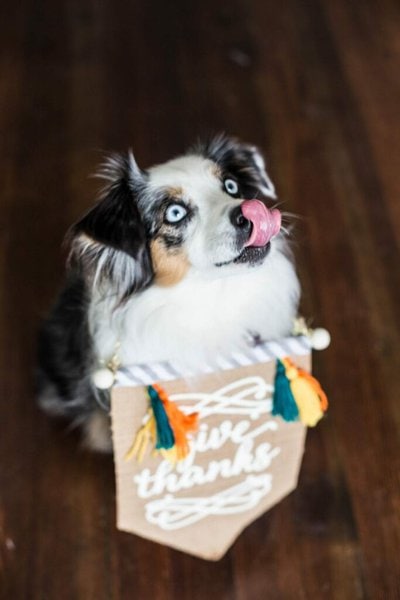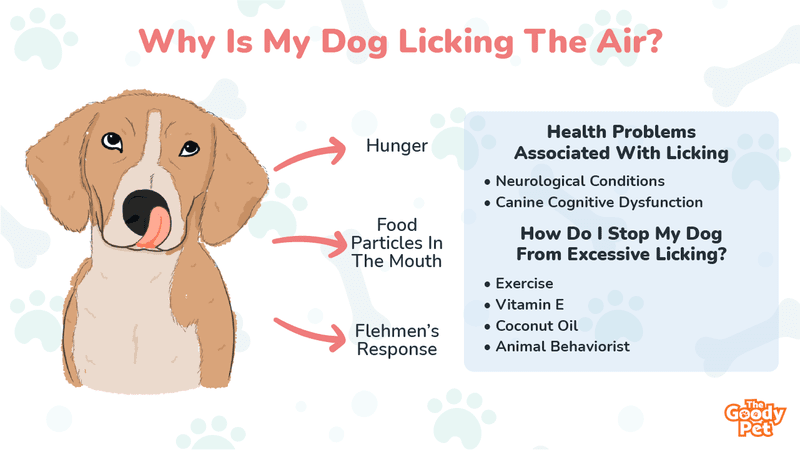Is your dog licking the air? Don’t worry, and you’re not alone. This weird behavior is actually a common thing for dogs.
There are a few reasons why your dog may be licking the air.
It can be that they are trying to get something off their fur, or they may be trying to cool themselves down. If your dog is panting and licking the air at the same time, it’s likely feeling overheated and is trying to cool itself down. If your dog is just licking the air without anything else going on, it’s likely to be curious or seeking attention.
Let’s take a more in-depth look at some of the possible reasons.
Why Does My Dog Excessively Lick The Air?
The normal causes are due to hunger, thirst, food particles in the mouth, and flehmen response. You shouldn’t lose a good sleep if any of these is the reason why your pooch is excessively licking the air.
Hunger
Your fur baby probably licks the air to let you know that it’s hungry. When your fur baby gets excited, its digestive enzymes start working. The excitement causes your dog to stick its tongue out and look like it is licking the air.
Thirst
If you see your pooch licking the air after meals, it means that it is asking for some freshwater to drink. Also, if your pooch does not have access to clean water 24/7, dry mouth, as a result of thirst, causes excessive licking of air.
Food Particles In The Mouth
How many times has it happened to you when, after eating something sticky, say, your fave Baby Ruth chocolate bar, some of the sticky and gooey particles are left on top of your mouth? You do some ‘tongue acrobatics’ to remove those particles, right?
The same goes for your fur baby. If some food particles are left in its mouth, it will lick the roof of its mouth to get rid of those particles that make your pooch uncomfortable.
Flehmen Response
Your fur baby has a much greater sense of smell than you. If you see your pooch licking the air, it could be a flehmen response to a scent that is exciting. This canine behavior consists of pushing up and curling back its upper lip as well as wrinkling its nose in order for the vomeronasal organ to get exposed.
Also known as Jacobson’s organ, this organ allows your pooch to fully smell something, say, urine, blood, or fecal matter. As a flehmen response to an interesting smell, your pooch puts its tongue out to catch the small particles in the air via the open ducts in its mouth.
Short of saying, your fur baby is just trying to take in a potent smell that’s why it appears like it is licking the air.
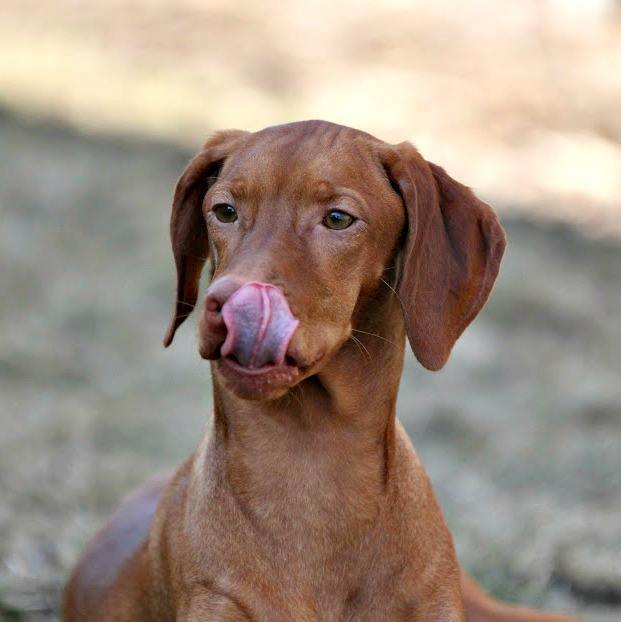
Why Is My Dog Licking The Air And Gulping?
Air licking can become a concern when the behavior becomes persistent or excessive and if it is associated with other symptoms like seizures.
There are health problems associated with licking and gulping air, and such problems can range from minor to serious health complications, something not to be ignored. Some possible medical causes can include:
Gastrointestinal Disorder
The medical term used for excessive licking of air and surfaces among dogs is called Excessive Licking of Surfaces or ELS. This canine behavior is strongly correlated with gastrointestinal disorders such as chronic pancreatitis and esophagitis.
Gastrointestinal disorders can cause so much pain to your beloved pooch. Plus, they can cause nausea, so air licking and gulping are some ways a dog may know to do in order to deal with both pain and nausea.
Skin Disorders
Dogs with skin disorders will usually lick the air if they have itchy skin. It would normally start by licking the itchy parts like the paws and the tummy area. Fur parents who do not understand this licking behavior would admonish their pets. As a result, these fur babies turn to lick the air to ‘comfort’ themselves.
Dental Problems
How are your fur baby’s gums and teeth? Are they covered with tartar and plaque? How’s the smell of its breath? Is it fresh or foul-smelling? We are asking these questions because a dog going through dental pain issues usually licks the air as a way to deal with dental pain.
A simple tooth plaque can result in tartar formation and, eventually, gum disease, also known as periodontal disease. If left untreated, your pooch may also lose some of its teeth, and abscesses may form, causing pain.
When you can, do consider looking into dental water additives, as such additives are a simple solution to maintaining the good oral health of your pooch. Additives work simply by adding a tablespoon of the liquid ingredient to the daily water serving for your pooch.
Trauma
A cut, a puncture, or trauma to the face, nose, or mouth may feel tingly to your dog and may cause it to scratch, lick its nose, and lick the air to soothe itself. Also, if your dog had an accident and previously underwent a procedure, this may cause your pooch to lick the air as a way to cope with pain.
Neurological Conditions
Occasionally, if you see that your dog is licking and gulping the air, it can be a symptom of a mild seizure. During episodes of seizures, the muscles are affected and cause all sorts of involuntary movements like twitching, biting, snapping, or biting the air.
Canine Cognitive Dysfunction
Senior dogs develop canine cognitive dysfunction, which is almost the same as Alzheimer’s Disease in humans. It is common to see old dogs with this condition exhibit repetitive behaviors like licking the air.
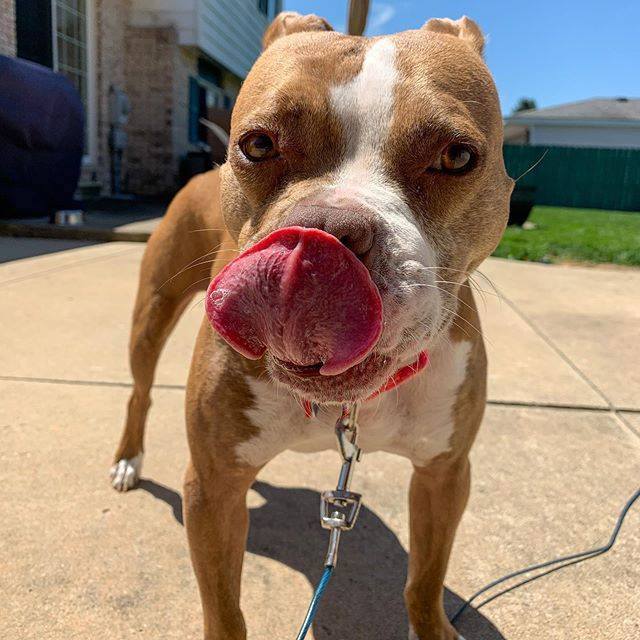
Why Do Dogs Lick The Air When You Scratch Their Bum?
Dogs may lick the air whenever you scratch their bum, and that is just a harmless knee-jerk reaction, nothing medical related.
Some of the behavioral reasons for doing so are stress, attention-seeking behavior, compulsive disorder, and boredom. And, then, of course, love language can be the other reasons.
Stress
Licking is a common symptom of stress, confusion, and discomfort. Loud noises like firecrackers and thunderstorms can cause a lot of stress for dogs. This is why you might see your furry friend licking the air when it’s feeling stressed out.
By licking the air, your pooch stimulates its brain to release a hormone known as endorphins. This hormone is supposed to provide your dog with a soothing effect that helps it cope with stress and anxiety. In the same manner that scratching its bum also releases the feel-good hormone to relieve it of stress.
Attention-Seeking Behavior
Any type of canine behavior can be a form of attention-seeking. Scratching your dog’s bum surely has positive effects. It’s relaxing and definitely feels good, considering that the base of its tail has a lot of sensitive nerve endings. Short of saying, it is like giving your pooch a nice back massage.
In this case, the pleasure principle is the reason why your dog is licking the air each time you scratch its bum.
Compulsive Behavior
Some dogs lick the air as a result of a compulsive disorder. A type of disorder that results in a series of repetitive actions that are consistent in their presentation. Though these do not generally serve any purpose, some argue that this behavior is done to alleviate nervousness.
Boredom
Did you just leave your pooch all by itself with no forms of entertainment like toys? If yes, then your pooch is simply entertaining itself by way of chewing your shoes and furniture and also by licking the air. Short of saying, air licking is an act to fight boredom.
And when you’re back home, you give it a ticklish belly rub and a nice scratch on its bum. Now, once again, you see your pooch lick the air, this time as a sigh of relief from separation anxiety.
Love
When something feels good, like a scratch on the bum, your beloved pooch will lick the air as a way of saying, “thanks! I enjoy what you’re doing to me.” For your pooch, scratching its butt is a love language and licking the air means that it is having a great loving time with you.
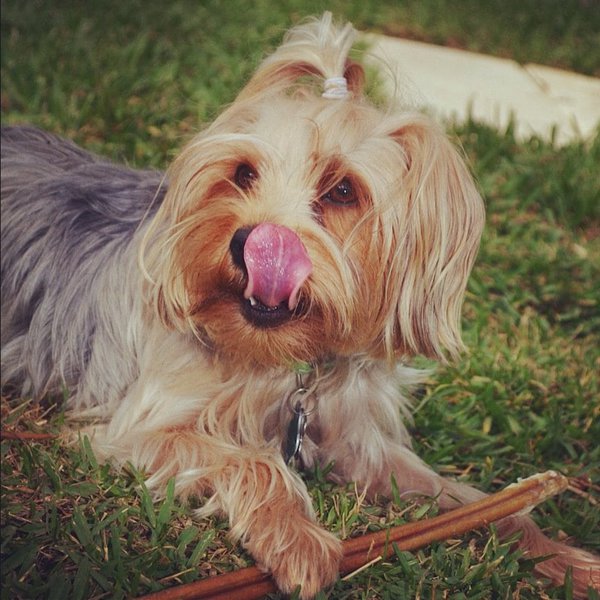
How Do I Stop My Dog From Excessive Licking?
Assuming that there’s nothing medically wrong with your fur baby, you can stop your dog from excessive licking by helping it with stress management, distracting it from licking, and increasing its exercise level.
In addition, kitchen staples, like apple cider vinegar and coconut oil, may be used to control skin discomforts that cause excessive licking. Lastly, if these home remedies fail, you may want to get expert advice from an animal behaviorist.
Stress Management
If stress is the cause, managing the environment is the best solution to stop compulsive licking. Say, for example, if the culprit is a new pet, give your fur baby enough time to get accustomed by slowly encouraging brief moments of playtime. You can gradually increase until both of them are already in the ‘friend zone’.
And, while you are away, we recommend that you provide your pooch with forms of entertainment to relieve it of its stress. Leaving the television turned on or giving your pooch plenty of toys, especially the ones that you can fill with peanut butter are good home remedies to stop your pooch from licking the air.
Distracting Your Pooch From Licking
If you see your pooch licking the air or an object, say a fabric, distract it by throwing its favorite toy as far as possible. This will distract your pooch from excessive licking. Instead, it will shift its attention to its favorite toy.
Another way to interrupt the licking behavior is to clap and say ‘no’ in an authoritative manner. Be consistent, each time you catch your dog licking an object, you should respond this way so your pooch will learn to associate licking with an unpleasant sound and your objection.
Exercise More
As we’ve seen earlier, anxiety and obsessive behaviors result in excessive licking. What you should do is increase the physical activities of your pooch. If you run with your pooch before heading to the office, increase it by doing another round when you get home from work.
Apple Cider Vinegar
Skin disorders, like paw pad infections, lead to excessive licking. As a staple in most households, apple cider is effective in combating bacterial infection, thus providing relief from itchiness.
Simply mix two parts of water and 1 part of unfiltered apple cider vinegar. Soak your pet’s paw in this solution for 5 minutes. No need to rinse after, and can be done twice a day until excessive licking is eliminated.
Vitamin E
Vitamin E is effective in treating dry skin. Puncture the Vitamin E capsule to extract the oil. Rub directly on the dry portions of the skin and allow it to dry. You may do this procedure 2 to 3 times daily until you observe that compulsive licking behavior is significantly reduced.
Coconut Oil
The high-fat content of coconut oil helps in the healing process of dry skin. Simply apply a small amount of oil to the paw pads or other parts of the body and massage the oil for 1 minute. You don’t have to rinse off. May be safely done twice a day.
Animal Behaviorist
If the problem of compulsive behavior can’t be managed with home remedies, medications, like antidepressants, are usually prescribed to control its excessive licking behavior.
